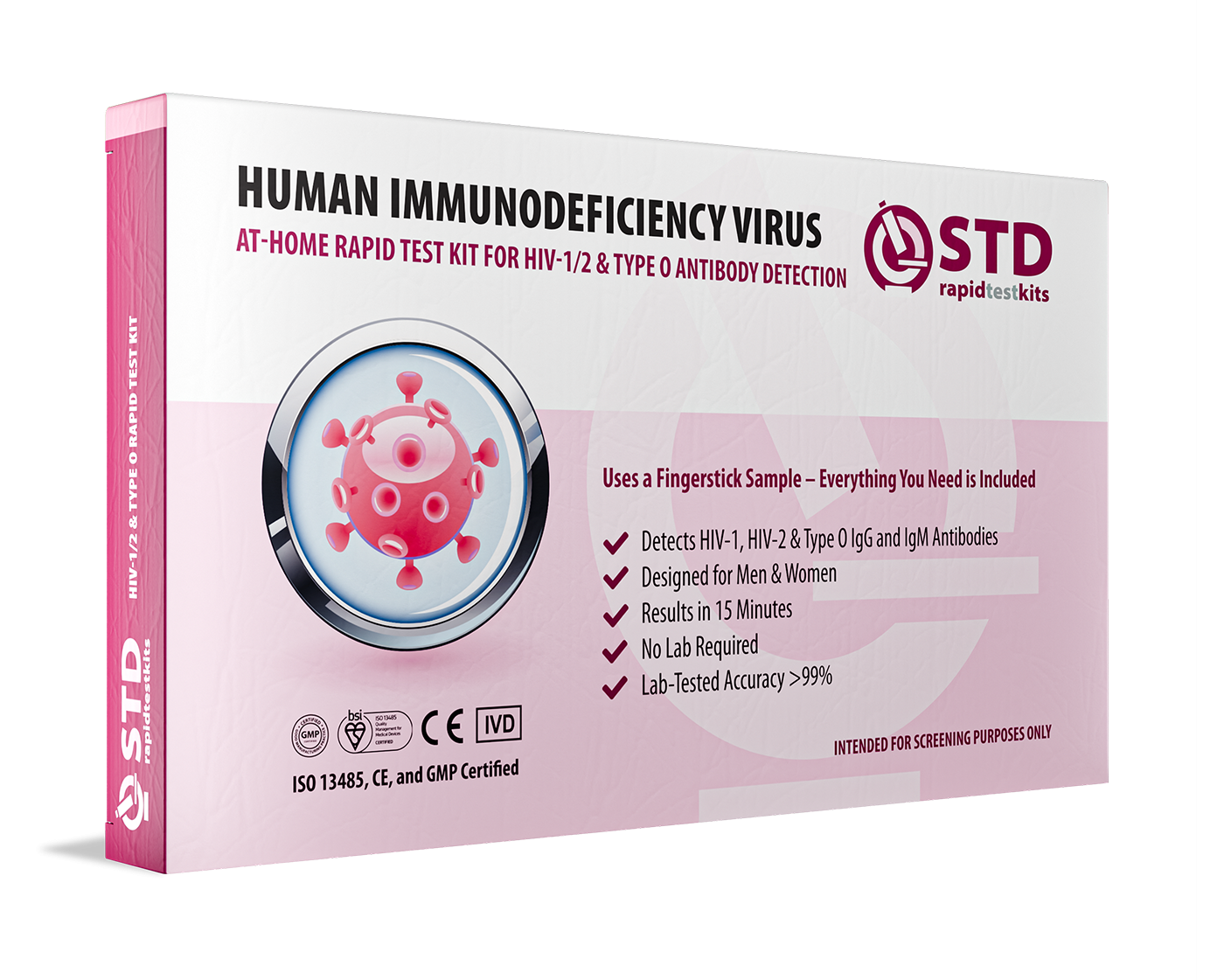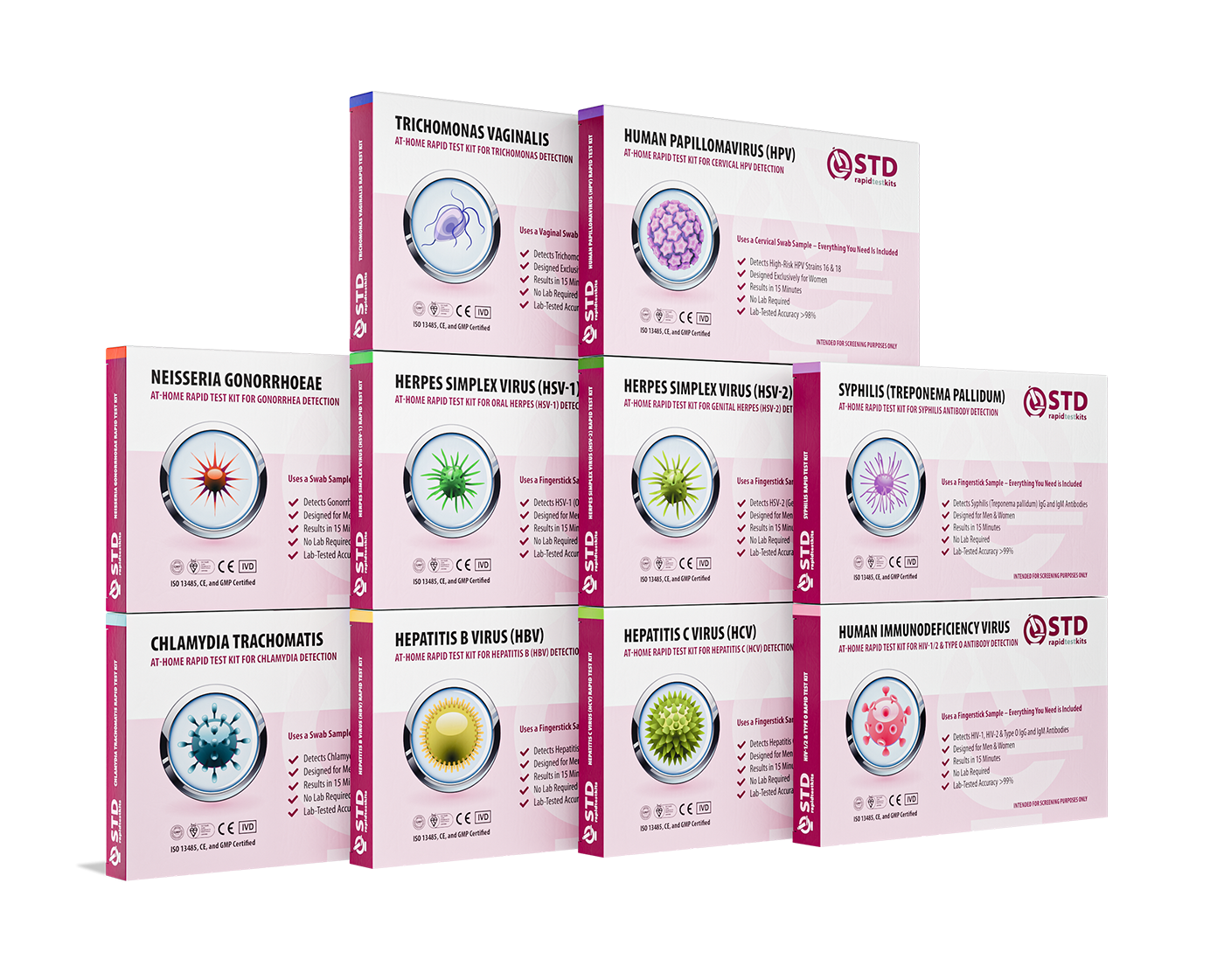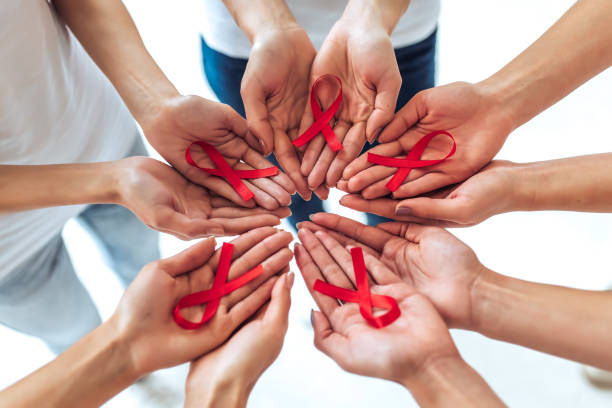Quick Answer: A positive at-home HIV test result is a powerful first step, but it’s not the final word. You’ll need to confirm it with a follow-up lab test, start treatment right away if confirmed, and connect with care and support systems. With early treatment, HIV is manageable and people live long, full lives. You’re not alone, and you’re not powerless.
First: Understand What a Positive At‑Home HIV Test Means
At-home HIV tests are a critical access tool, especially for people without insurance, privacy, or trust in medical institutions. But they’re not the final word. Here’s what you need to know:
Two main types of HIV home tests:
- Oral swab (e.g., OraQuick): Detects HIV antibodies, results in 20–40 minutes
- Fingerstick blood test (e.g., Everlywell, myLAB Box): Sends a sample to a lab for antibody and antigen testing
These tests are highly accurate, but false positives can occur, especially with oral swabs. That’s why every positive at-home result must be confirmed by a laboratory-based test, usually involving a combination of antibody and nucleic acid (RNA) testing.
Don’t panic. False positives are rare but possible. Don’t dismiss the result, but don’t assume the worst either. The next step is confirmation.
People ae also reading: STD Prevention for Queer Women; Yes, It Matters
Confirm Your Result with a Follow-Up Lab Test
After an initial positive result, you need a confirmatory test to determine your HIV status. These tests are usually free or low-cost at health departments, LGBTQ+ clinics, community health centers, and sexual health providers.
What confirmation involves:
- A second test, usually a blood draw, to detect HIV antibodies and antigens
- Sometimes an RNA (viral load) test, which detects HIV’s genetic material
- Results within 1–5 days depending on the lab
Where to go:
- Local health department (search “free HIV testing near me”)
- Planned Parenthood or LGBTQ+ health centers
- Your primary care provider (if you have one)
- Free or sliding-scale community clinics
Pro tip: Bring your home test packaging or documentation with you if possible. It helps providers know what kind of test you used.
Don’t wait. Even one day of uncertainty can fuel fear. Getting the truth is the first step to healing and hope.
What If It’s Confirmed: Starting Treatment Right Away
If your result is confirmed as positive, take a deep breath. You are not dying. HIV is treatable. In fact, with early diagnosis and care, people with HIV live full lifespans, maintain careers, have children, and thrive.
HIV treatment = Antiretroviral Therapy (ART), a daily pill or injection that:
- Reduces the amount of virus in your body (viral load)
- Helps your immune system stay strong
- Lowers your risk of passing HIV to others to nearly zero
The goal is to become undetectable, which means the virus is so low it can’t be found in standard tests. Undetectable = Untransmittable (U=U). You can still love, have sex, and build a future.
Most people feel better physically and emotionally once treatment starts. You’ll likely see your viral load drop within weeks. Staying on medication daily is key, but so is building a support team around you.
How to Tell Your Partners, Safely and Thoughtfully
One of the hardest parts of an HIV diagnosis is wondering who to tell, how, and when. You may feel guilt, anger, or fear, especially if you’ve had recent partners. But disclosure doesn’t have to be a punishment. It can be an act of care and clarity.
Tips for safer disclosure:
- Confirm your diagnosis first: Don’t disclose until a lab test verifies it
- Choose a safe, private setting: Whether in person, phone, or secure messaging
- Keep it clear and calm: “I tested positive for HIV and want you to be informed” is a good place to start
- Share resources: Give them info on testing and prevention (like PrEP)
- Prepare for mixed reactions: Some will support you. Others may need time. That’s about them, not your worth.
If you don’t feel safe or don’t want to contact someone directly, you can use anonymous notification tools like state health departments’ anonymous notification services
Disclosure isn’t about shame, it’s about power and truth. You’re allowed to protect yourself and others at the same time.
Check Your STD Status in Minutes
Test at Home with RemediumHIV Rapid Test Kit

 For Men & Women
For Men & Women Results in Minutes
Results in Minutes No Lab Needed
No Lab Needed Private & Discreet
Private & DiscreetOrder Now $33.99 $49.00
Emotional Aftershocks: Grieving, Coping, and Surviving
After a positive test, many people don’t just feel scared, they feel shattered. You might cry, isolate, panic, go numb, or spiral. That doesn’t mean you’re weak. It means you’re human. Processing this news takes time.
Common emotional reactions:
- Shock: “This can’t be happening.”
- Anger: At a partner, system, or yourself
- Shame: Feeling “dirty” or “damaged” (you’re not)
- Grief: Mourning the body or future you thought you had
- Isolation: Believing no one will love you again (they will)
You don’t need to go through this alone. Look for support:
- HIV-positive peer networks (The Well Project, Positively Trans, Body Positive)
- Therapists who specialize in sexual health or trauma
- Online communities on Reddit, Twitter, or Discord
- LGBTQ+ centers with HIV support groups
This diagnosis isn’t a moral failure. It’s a medical condition. And you deserve care, connection, and healing.
Partnering with a Doctor You Trust
Choosing your HIV care provider is one of the most important decisions after diagnosis. You need someone who respects your identity, understands HIV care, and treats you like a whole person, not just a patient.
Look for a provider who:
- Specializes in infectious disease or HIV care
- Works with LGBTQ+ or BIPOC communities
- Can help you start ART quickly
- Listens, explains clearly, and doesn't shame
You have a right to:
- Ask questions about every medication
- Switch doctors if one makes you feel unsafe
- Get help navigating insurance or co-pay programs
Start by checking providers at community clinics, HIV centers, or telehealth services. Your doctor isn’t your boss. They’re your teammate in survival.
Your Rights: Privacy, Employment, and Insurance Protections
Living with HIV doesn’t mean giving up your rights. In fact, you have legal protections at work, in housing, in school, and in health care. Know them.
In the U.S., your rights include:
- HIPAA: Your diagnosis is confidential. Doctors can’t share it without permission.
- ADA: HIV is protected under disability law. Employers can’t fire or discriminate against you.
- ACA: Health insurers can’t deny you coverage or charge you more because of HIV.
If you’re undocumented, uninsured, or facing stigma:
- Seek help from HIV legal advocacy groups (like Lambda Legal or The Center for HIV Law and Policy)
- Use community health programs that don’t require citizenship
Getting a diagnosis doesn’t mean giving up freedom. It means learning how to protect your body, and your rights, more fiercely than ever.
People are also reading: Can Birth Control Make Herpes Worse?
Undetectable = Untransmittable (U=U): What That Actually Means
One of the most important things to understand after an HIV diagnosis is the concept of Undetectable = Untransmittable, often shortened to U=U. It’s more than a slogan, it’s a fact backed by years of scientific research.
What it means: If you’re on antiretroviral therapy (ART) and your viral load becomes “undetectable,” you cannot transmit HIV to sexual partners. Zero risk. Period.
How to become undetectable:
- Start ART as soon as possible
- Take your meds daily, on schedule
- Check your viral load every 3–6 months
This isn’t wishful thinking, it’s global public health policy. People with HIV who are undetectable can have sex, fall in love, and even start families without fear of transmission. You can still have a full, meaningful sex life. And yes, you are still desirable.
Can I Still Have Sex After a Positive Test?
Yes, absolutely. But you might need time, emotionally and physically, to get there. Sex after diagnosis is possible, beautiful, and valid. You just might need to reframe what safety and intimacy mean to you now.
If your viral load is undetectable: You can’t transmit HIV to partners through sex (U=U).
If you’re still waiting for confirmation or starting meds:
- Use condoms or other barriers
- Inform partners if you feel safe disclosing
- Explore other forms of intimacy, touch, oral, mutual pleasure
Your diagnosis doesn’t take away your right to be loved or touched. You can have hot, consensual, affirming sex. And you’ll find partners who care about you, not just your viral status.
Building Your Care Network: You Don’t Have to Do This Alone
Healing from a diagnosis takes more than pills. It takes people. Whether it’s a doctor, friend, hotline, or online stranger, connection is survival. Here’s how to build your care web.
Find your people:
- Local support groups: LGBTQ+ centers, HIV orgs, or sexual health nonprofits
- Online communities: Reddit (/r/HIVAIDS), Facebook groups, or POZ Forums
- Hotlines: National HIV Hotline (1-800-CDC-INFO), The Trevor Project, Trans Lifeline
- Apps and dating platforms: Some platforms allow HIV+ status disclosure to meet affirming partners
Sometimes care is clinical. Other times it’s someone texting “You okay?” at 2am. Both matter. And you deserve all of it.
Check Your STD Status in Minutes
Test at Home with Remedium10-in-1 STD Test Kit

 For Women
For Women Results in Minutes
Results in Minutes No Lab Needed
No Lab Needed Private & Discreet
Private & DiscreetOrder Now $189.00 $490.00
For all 10 tests
What About the Future? Sex, Love, Work, and Dreams
A new diagnosis can make everything feel paused. Careers, relationships, even your self-image. But here’s the truth: people with HIV go on to lead extraordinary lives. Artists, parents, sex workers, athletes, therapists, HIV doesn’t erase who you are. It adds a chapter, not an ending.
Things that don’t change with HIV:
- Your worth
- Your ability to love and be loved
- Your right to work, dream, and heal
- Your capacity for joy and connection
You will still date, travel, flirt, cry, and laugh. You will still wake up one day and forget for a moment that you’re positive. That’s okay. HIV lives with you, not the other way around.
FAQs
1. How accurate are at-home HIV tests?
Most FDA-approved tests are 92–99% accurate for detecting HIV antibodies. A positive result still needs confirmation by a lab test.
2. Can you get a false positive on an at-home HIV test?
Yes, especially with oral swab tests. That’s why confirmatory blood tests are required before a diagnosis is official.
3. What’s the first step after a positive result?
Get a lab confirmation. You can find free or low-cost clinics via your health department or Planned Parenthood.
4. How soon should I start treatment?
As soon as possible. ART can begin immediately after confirmation and works best when started early.
5. Will I ever be “cured” of HIV?
There’s no cure yet, but ART can reduce the virus to undetectable levels, meaning you can’t transmit it sexually.
6. How often do I need to see a doctor?
Most people visit their HIV care provider every 3–6 months for checkups, bloodwork, and med refills.
7. Will I still be able to have sex?
Yes. With treatment and undetectable viral load, sex is safe and affirming. Many continue dating and building relationships.
8. Do I have to tell past partners?
It’s encouraged, for their health and yours. You can use anonymous tools like TellYourPartner.org if needed.
9. Can I work or travel like normal?
Yes. In most countries, HIV doesn’t restrict work or travel. Some nations have immigration limits, check ahead.
10. Where can I find support?
Try online forums, LGBTQ+ clinics, peer groups, or national HIV hotlines. You’re not alone. Help is waiting.
A Positive Result Isn’t the End, It’s the Beginning of Clarity
You took the test. You got your result. And now you’re here,reading, learning, choosing what’s next. That’s courage. That’s power.
An HIV diagnosis doesn’t define you. What defines you is how you respond. And if you’re reading this? You’re already responding with strength.
The path forward won’t always be easy, but it’s absolutely yours. With treatment, support, and clarity, you can live fully, love deeply, and thrive beautifully. Don’t let stigma drown out your worth. This is your body, your life, your comeback story.
STD Rapid Test Kits offers lab-accurate, discreet HIV testing and partner-friendly tools to help you stay informed,from first test to next chapter.
Sources
2. Self‑Testing: What Positive Results Mean – CDC
3. Getting Tested for HIV: Steps After a Positive Result – CDC
4. Just Diagnosed: Next Steps After Testing Positive for HIV – HIVinfo (NIH)
5. Information on OraQuick In‑Home HIV Test – FDA
6. Pre‑test and Post‑test Services After HIV Diagnosis – WHO/NIH via NCBI
7. False‑Positive Results and Confirmatory Testing – Aidsmap










